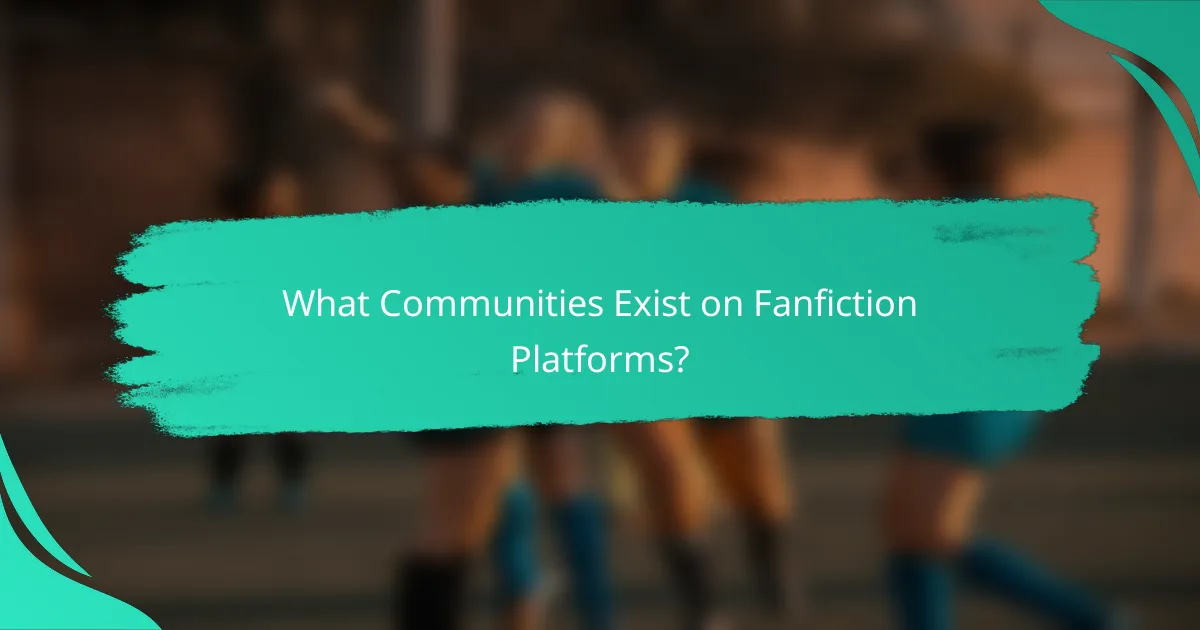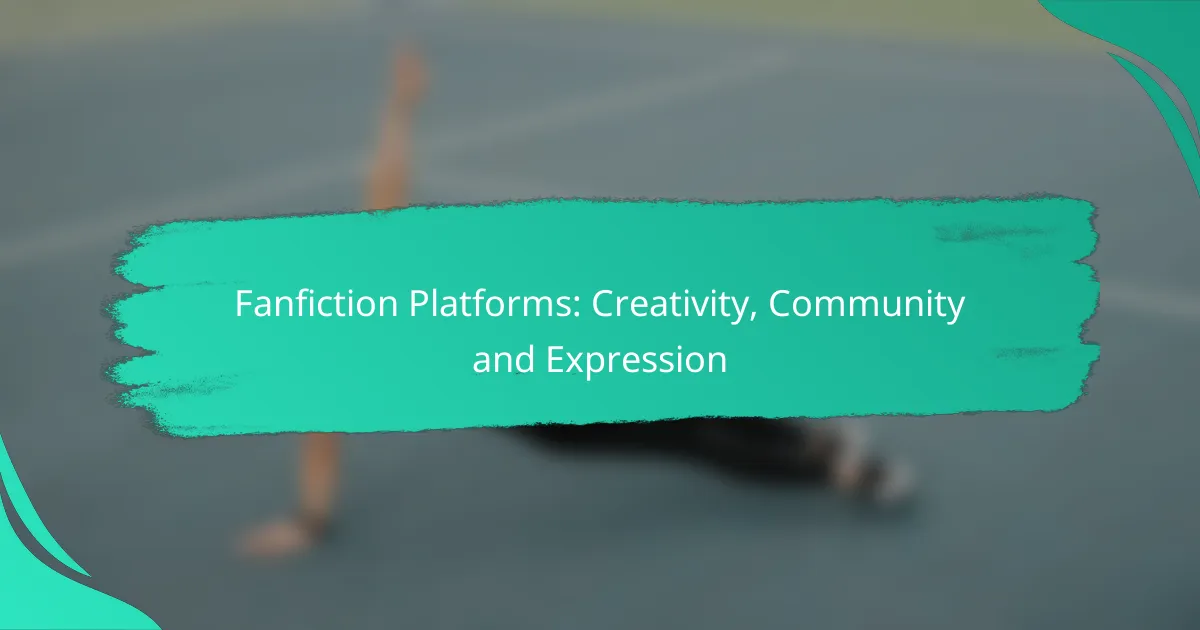Fanfiction platforms serve as vibrant hubs for creativity, community, and self-expression, allowing writers to explore their ideas and share their stories with others. With options like Archive of Our Own, FanFiction.net, and Wattpad, these platforms cater to diverse writing styles and preferences, fostering connections among like-minded individuals. By providing unique tools and features, they enhance the writing experience and encourage collaboration within various genre-focused communities.

What Are the Best Fanfiction Platforms?
The best fanfiction platforms offer unique features that cater to diverse writing styles and community preferences. Popular options include Archive of Our Own, FanFiction.net, Wattpad, Quotev, and FictionPress, each providing distinct environments for creativity and reader engagement.
Archive of Our Own (AO3)
Archive of Our Own (AO3) is a non-profit platform known for its user-friendly interface and extensive tagging system. It allows writers to publish their works across various fandoms, making it easy for readers to find stories that match their interests.
One of AO3’s standout features is its commitment to user rights and content ownership, which appeals to many creators. The platform supports a wide range of genres and themes, including mature content, fostering a diverse writing community.
FanFiction.net
FanFiction.net is one of the oldest and most established fanfiction sites, hosting millions of stories across numerous fandoms. Its straightforward layout makes it easy for users to navigate and find stories by category, character, or genre.
While FanFiction.net has a large user base, it has faced criticism for its lack of modern features, such as advanced search options and mobile compatibility. Writers should consider these limitations when choosing a platform for their work.
Wattpad
Wattpad is a popular platform that combines fanfiction with original storytelling, attracting a broad audience. It offers interactive features like comments and voting, allowing readers to engage directly with authors and other fans.
Writers on Wattpad can benefit from its social networking aspects, which help in building a following. However, the platform’s focus on original content means that fanfiction may not receive the same level of visibility as original works.
Quotev
Quotev is a versatile platform that allows users to create and share stories, quizzes, and polls. It has a strong community aspect, encouraging interaction among users through comments and messaging.
While Quotev supports fanfiction, it also caters to original content creators, making it a good choice for those who want to explore both avenues. However, the platform’s layout may be less intuitive compared to others, which could affect user experience.
FictionPress
FictionPress is a sister site to FanFiction.net, focusing primarily on original fiction. While it does not cater specifically to fanfiction, it provides a platform for writers looking to publish their original stories in various genres.
Writers interested in branching out from fanfiction to original content may find FictionPress appealing. However, those solely focused on fanfiction may want to consider other platforms that better suit their needs.

How Do Fanfiction Platforms Foster Creativity?
Fanfiction platforms encourage creativity by providing spaces where writers can explore their ideas, share their stories, and connect with like-minded individuals. These platforms facilitate self-expression through various tools and features designed to enhance the writing experience.
User-generated content
User-generated content is the backbone of fanfiction platforms, allowing writers to publish their stories and receive feedback from the community. This content can range from short one-shots to extensive multi-chapter epics, covering a wide array of genres and fandoms. The freedom to create and share unique narratives fosters a vibrant culture of creativity.
Writers can experiment with different styles and themes, often drawing inspiration from existing works while adding their personal twists. This encourages not only individual creativity but also a diverse array of stories that appeal to various audiences.
Collaborative writing features
Many fanfiction platforms offer collaborative writing features that enable multiple authors to work on a single story. This can include shared documents, comment sections for brainstorming, and even role-playing elements where writers can take on different characters. Such collaboration enhances creativity by allowing writers to combine their strengths and ideas.
These features can lead to innovative storytelling techniques and unique plot developments that may not emerge in solo writing. However, clear communication and mutual respect are essential to ensure a smooth collaborative process.
Character and world-building tools
Character and world-building tools on fanfiction platforms help writers develop rich, immersive settings and complex characters. Many platforms provide templates or guides for creating detailed character profiles, including backstories, motivations, and relationships. This structured approach can spark creativity and help writers think deeply about their narratives.
World-building tools allow authors to outline the rules and dynamics of their fictional universes, which can enhance the believability of their stories. Writers should take advantage of these tools to create cohesive and engaging narratives that resonate with readers.

What Communities Exist on Fanfiction Platforms?
Fanfiction platforms host a variety of communities that cater to different interests and preferences, allowing writers and readers to connect over shared passions. These communities often focus on specific genres, character pairings, or writing challenges, fostering creativity and collaboration among members.
Genre-specific groups
Genre-specific groups on fanfiction platforms allow users to explore and create stories within particular genres such as fantasy, romance, science fiction, or horror. These communities often share resources, recommendations, and writing tips tailored to their genre, enhancing the overall experience for both writers and readers.
When joining a genre-specific group, consider the group’s activity level and the types of stories being shared. Engaging with active communities can lead to valuable feedback and inspiration for your own writing.
Pairing-focused communities
Pairing-focused communities center around specific character relationships, often referred to as “ships.” These groups allow fans to delve into the dynamics of their favorite pairings, sharing fanfiction that explores various scenarios and interpretations of the characters’ interactions.
Joining a pairing-focused community can provide a sense of belonging and connection with others who share similar interests. Be mindful of the group’s rules regarding content, as some may have restrictions on certain themes or pairings.
Writing challenges and contests
Writing challenges and contests are popular features on fanfiction platforms, encouraging writers to create stories based on specific prompts or themes within a set timeframe. These events often foster a sense of camaraderie and healthy competition among participants.
To get involved, look for upcoming challenges that match your interests and skill level. Participating can improve your writing skills and help you connect with other writers. Remember to read the guidelines carefully to ensure your submission meets the requirements.

How to Choose the Right Fanfiction Platform?
Selecting the right fanfiction platform involves understanding your creative goals, the audience you want to engage with, and the features offered by each site. Consider how these elements align with your writing style and community preferences to find the best fit for your fanfiction.
Consider audience engagement
Audience engagement is crucial for sharing your fanfiction effectively. Look for platforms that allow interaction through comments, reviews, and ratings, as these features can enhance reader involvement and provide valuable feedback.
Some platforms may have larger user bases, which can lead to more exposure, while others might foster a tighter-knit community. Assess where your target audience is most active to maximize your engagement potential.
Evaluate platform features
Different fanfiction platforms offer various features that can impact your writing experience. Key aspects to consider include formatting options, tagging systems, and search functionalities, which can help readers find your work more easily.
For example, some sites allow for multimedia integration, while others focus solely on text. Determine which features are most important to you and how they can enhance your storytelling.
Assess community guidelines
Understanding community guidelines is essential to ensure your work aligns with platform rules. Each site has its own policies regarding content, copyright, and acceptable themes, which can affect what you can publish.
Before committing to a platform, review its guidelines thoroughly. This will help you avoid potential issues and ensure that your fanfiction is welcomed and appreciated within the community.

What Are the Monetization Options for Fanfiction Writers?
Fanfiction writers have several monetization options, ranging from direct sales to crowdfunding. These methods allow creators to earn income while sharing their stories with a dedicated audience.
Patreon and Crowdfunding
Platforms like Patreon enable fanfiction writers to receive financial support directly from their readers. Writers can offer tiered memberships that provide exclusive content, early access to stories, or behind-the-scenes insights, fostering a community around their work.
When setting up a crowdfunding campaign, consider what rewards will entice your audience. Offering personalized content or special shout-outs can enhance engagement and encourage more patrons to support your writing.
Self-Publishing and E-Books
Self-publishing fanfiction as e-books can be a lucrative option. Writers can compile their stories into collections and sell them on platforms like Amazon Kindle or Smashwords. This approach allows for greater control over pricing and distribution.
Ensure your e-book is well-edited and formatted to meet reader expectations. Pricing can vary, but many successful e-books are priced between $2.99 and $9.99, making them accessible while still providing a profit margin.
Merchandising
Writers can create merchandise related to their fanfiction, such as prints, apparel, or collectibles. This not only generates income but also promotes the stories and builds a brand around the writer’s work.
Consider using print-on-demand services to minimize upfront costs. Platforms like Redbubble or Teespring allow you to design and sell merchandise without needing to hold inventory, making it easier to start.
Advertising and Sponsorships
Incorporating ads into a blog or website dedicated to your fanfiction can provide a revenue stream. Google AdSense and affiliate marketing programs allow writers to earn money based on traffic and sales generated through their content.
Be mindful of the balance between monetization and user experience. Too many ads can deter readers, so it’s essential to maintain a clean and engaging site while still generating income.
